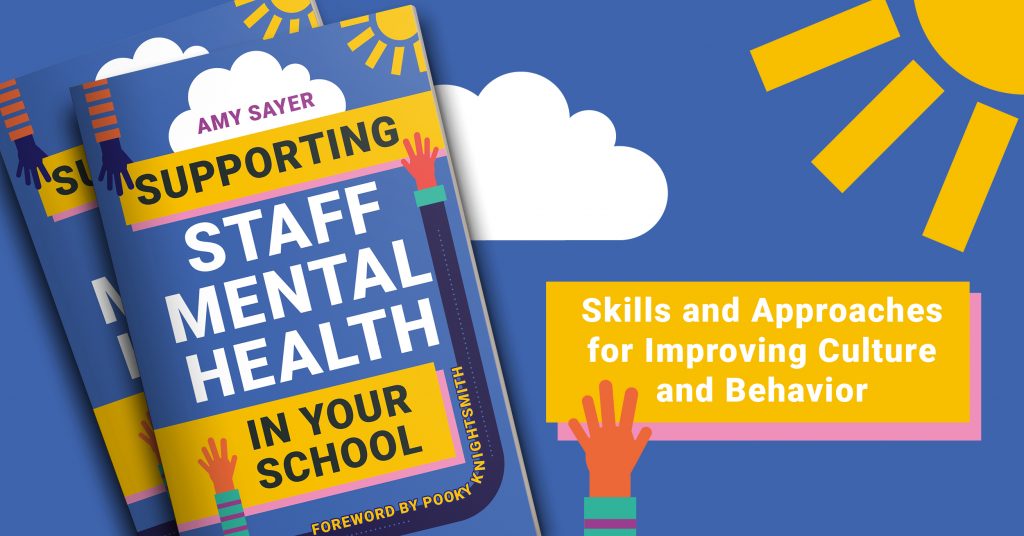
Amy Sayer is the author of Supporting Staff Mental Health in Your School and is a teacher at Chichester High School and Head of Philosophy and Ethics. She has previously been MH lead and responsible for supporting disadvantaged children.
When I started the research for my book over 2 years ago, there was a lot of evidence that many teachers were struggling with their mental health in the same way that I had. They felt anxious, alone and ashamed and weren’t sure about the support that schools or other organisations could offer them. Many just could not face the audience of 30 children for 5 hours a day 5 days a week.
Various reports suggested that many were thinking of leaving the profession due to the strain on their mental health. However, I also knew that things could be different, and with the right support, teachers who were struggling with a mental health condition could stay in the job they loved. In my book I wanted to give some practical strategies, case studies, examples but most importantly, hope. Hope that things could be different in schools in a systemic way and that people could talk about their mental health without stigma or shame. Then COVID happened. It made the need for staff mental health support in schools to be essential rather than optional. Many school staff have been struggling with mental health symptoms for the first time due to the unpredictable and ever changing nature of their roles in all aspects of their lives. They were being asked to juggle balls before, but now they are being asked to be juggling knives blindfolded on a unicycle which was on fire. The safety and the security of their classrooms was no longer there as a reference point and the
The charity Education Support reported that 50% of teachers felt that their mental health had deteriorated a result of COVID and that 2 callers to their 24/7 helpline every day were assessed as being suicidal. Things have changed quickly and this is meaning more teachers than ever before are needing support. However, in the Teacher Wellbeing Index 2020, a staggering 57% of education professionals would not feel confident disclosing their mental health issues to someone in their schools. This is not good enough. These people should be working in a school with a clear system of support and guidance. Not worrying and struggling alone because they feel ashamed.
The different aspects that I cover in my book are:
- Why schools need to talk about staff mental health RIGHT NOW
- The signs and symptoms in colleagues who may be struggling
- Staff training to raise the profile of mental health in your school
- Staff wellbeing from the ground up
- Preventative Measures: How to Change Your School Environment to Support Positive Mental Health
- Putting the Theory into Practice: Scenarios to explore
The aim is that this book came be used by anyone working in a school who wants to lead on mental health and wellbeing. It gives practical examples of things which have worked in schools alongside some scenarios for teams to discuss and use when developing their own whole school strategy.
Having conversations about mental health can be hard, and many people are often worried that they will say or do the wrong thing and make the situation worse. The time and location of the conversation need careful consideration. Is there adequate time for the meeting? If the person you are talking to gets upset, will they be able to be comforted during this time? Is the meeting private and in a location where you will not be interrupted? These practicalities are vital in allowing the person to feel they have a safe space and the time to open up if they want to. The other two essential elements of a conversation are being present and showing empathy. We live in such a busy and chaotic time and the lure of our mobile phones to tell us the latest news can mean we can be attached to them like an umbilical cord. However, it is important that you are paying full attention to the member of staff, so put your phone down, try not to fiddle with things, and show them you are listening with your body language. Empathy can be really tricky for teachers who have an instinct to try to fix things and provide solutions. Mental health conversations need empathy and a space to be listened to sincerely. Some people find sympathy is not useful in conversations about mental health as it often leads to being dismissive of what the person is really saying. Empathy is accepting what they say and offering to share in the experience on a deeper level to provide support.